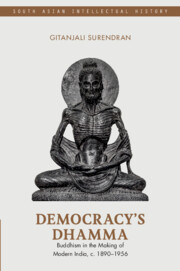Book contents
- Frontmatter
- Dedication
- Contents
- List of Figures
- Acknowledgements
- List of Abbreviations
- Introduction: Buddhism in the Making of Modern India
- 1 Anagarika Dharmapala in India
- 2 Dharmapala and Vivekananda in an Age of Universalism
- 3 Buddhism and The Bhadralok
- 4 The Buddhist Bay: Buddhist Mobility Across the Bay of Bengal
- 5 Buddhist Relics, The Mahabodhi Temple and The Discourse of a Shared Buddhism
- 6 Buddhism as a Civil Religion and Hindutva
- 7 Buddhism, Anti-Caste Radicalism and Socialism
- 8 Ambedkar, Dhamma and Democracy
- Conclusion: The Destinies of Buddhism
- Bibliography
- Index
8 - Ambedkar, Dhamma and Democracy
Published online by Cambridge University Press: 28 November 2024
- Frontmatter
- Dedication
- Contents
- List of Figures
- Acknowledgements
- List of Abbreviations
- Introduction: Buddhism in the Making of Modern India
- 1 Anagarika Dharmapala in India
- 2 Dharmapala and Vivekananda in an Age of Universalism
- 3 Buddhism and The Bhadralok
- 4 The Buddhist Bay: Buddhist Mobility Across the Bay of Bengal
- 5 Buddhist Relics, The Mahabodhi Temple and The Discourse of a Shared Buddhism
- 6 Buddhism as a Civil Religion and Hindutva
- 7 Buddhism, Anti-Caste Radicalism and Socialism
- 8 Ambedkar, Dhamma and Democracy
- Conclusion: The Destinies of Buddhism
- Bibliography
- Index
Summary
HINDU REFORM OR SOCIAL REVOLUTION?
In a brilliant essay well ahead of his times, D. R. Nagaraj, the late critic and translator, compared M. K. Gandhi and B. R. Ambedkar on caste and untouchability. Nagaraj argued that Gandhi reached the limits of anti-caste possibility with his insistence that caste stay in the spiritual-religious realm. By framing the caste issue in these terms, he rejected materialist demands of dalits, including reservation policies, alleviation of poverty and unemployment, and so on. Critically, Gandhi's argument that ridding Hinduism of untouchability and other forms of egregious caste violence was possible through a kind of self-purification was tantamount to saying that caste Hindus were the heroes of the story of dalit uplift. Ambedkar would have none of this and sought a properly political solution to the problems of the dalits even while being strongly influenced by Gandhian methods. He was also deeply aware that a radical spiritualism was the need of the hour to create a dalit subject who was confident and revolutionary even, and to foster an environment where such critical dalit subjects, masters of their own destiny, could emerge. The choice for dalits and for Ambedkar was between reforming Hinduism and breaking Hinduism. There were many detours and stops on that road but eventually Ambedkar would adopt a type of radical spiritualism in the form of Buddhist conversion, even after he had ensured the inclusion of political solutions for the dalits in post-independence India. The question is, why?
The sheer ambition of what he was trying to do and the different hats he wore to achieve his goals dogged Ambedkar, a peerless analyst of caste, throughout his career. How was he to bring together his academic analysis of what ailed Indian society, his political commitment to dalit rights and betterment, and his catholic ideological leanings towards American pragmatism, socialism, anti-colonial nationalism, democracy and caste radicalism to forge a new moral and ethical foundation for India? Politics required compromise, strategy and, sometimes, uncomfortable allies. True religion required a set of unwavering and humane principles different from the ones on offer. And democracy required a foundation for fraternity and fellowship among citizens as well as a certain psychological conditioning to overcome ‘the constitutive listlessness’ that was the dalit and lower-caste lot.
- Type
- Chapter
- Information
- Democracy's DhammaBuddhism in the Making of Modern India, c. 1890–1956, pp. 272 - 311Publisher: Cambridge University PressPrint publication year: 2025

